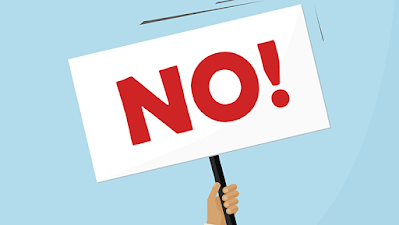
I could tell you a 100 reasons why you should say ‘No’, why trying to please others is futile, why setting boundaries is healthy – but you already know all that! Otherwise you would not be asking this question.
Therefore, I think it might be more useful to understand what stops us from saying ‘No’…even if we know we should? Why are we afraid?
The basic fear
I think it is pretty obvious that the basic fear we have is: “If I say ‘No, what will they think of me? Will they think I am a bad person?”
We can only guess what others are thinking, and then experience whatever we guess.
Let me say that again, we can never experience what others are thinking. We can only experience our own guess about what others are thinking about us
If I believe that “It is OK to say ‘No’. They will understand”, then my fear will evaporate. Saying ‘No’ will become very easy.
If I believe that “It is not OK to say ‘No’”, then I will obviously think “I am a bad, selfish person if I say ‘No’…and they will think the same about me” Then my fear will compound and suddenly, saying ‘No’ will seem extremely difficult!
So the real question we should be asking is: “Why do I myself think saying ‘No’ is bad?” I have to be convinced that saying ‘No’ is OK before anyone else is convinced
What do I think about saying ‘No’?
The answer might depend on the reasons for saying ‘No’. Let us examine each one of them.
Reason #1: “I am not ableto help, even if I want to”
Amit’s friend needs a loan of 10 Lakh rupees. Amit really wants to help out, but he can give only give 1 lakh at max. If he promises anything more than that, he would be lying. But Amit is more worried about “Even if I really cannot help, what if he thinks I do not want to?” So he says ‘Yes, sure!’.
Later on when he cannot deliver on this promise, his friend is obviously disappointed. In addition, he also feels betrayed! If Amit had said ‘No’ upfront, his friend could have at least made some alternative arrangements.
If Amit can see that even if his friend blames him for “not wanting to help” – at least Amit knows his friend is wrong. But if in his obsession to ‘Look good’, Amit makes a promise he cannot keep and his friend blames him for it – his friend would be right!
If Amit can see that he could actually make matters worse for his friend by saying ‘Yes’, then perhaps it becomes easier to say ‘No’. As simple as saying “I really want to help you buddy. But the max I can help with is 1 lakh. Will that help?” Simple!
Reason #2: “I can help, but I don’t want to”
This is the tricky one. Is this reason even valid? Is it a bad reason? This guilt makes us doubt ourselves and wonder “Can I really not help, or am I just making excuses because I don’t want to?”
The belief underlying all this confusion is: “If I can help, then I shouldhelp” Hence the guilt. Hence the difficulty in saying ‘No’. But is this belief true?
Are we obligated to help?
Remember that help is a favour, a choice. It is like saying “I love you”. There might be a hundred good, decent, noble people in this world. But we get to choose who we say “I love you” to! This does not mean all the rest are bad, or not worth loving. Or that we have to provide a reason for rejecting all others.
There is no moral obligation to say ‘Yes’. It is purely a choice.
It is extremely important to see this. It is your right to say ‘Yes’ or ‘No’. Absolutely no obligation.
But even though this is true – the person who has to hear a ‘No’ might still feel rejected. He might blame you for being ‘unfair’. It is human. But you cannot control that.
But if you are too afraid of his blame, you might say ‘Yes’. Remember that you are not doing this out of ‘goodness’. You are doing this out of fear. Making a promise you do not want to keep.
Then when the frustration happens, and you feel stuck – you like any other human, might end up blaming him for ‘forcing’ you, ‘guilting’ you to help! Again, very human. And very false. He is not responsible for the frustration. You are.
If we can see that saying ‘Yes’, when we want to say ‘No’ makes things much worse, we might get the courage to say ‘No’.
And when we do it, a strange thing happens. We see that the heavens do not fall, the earth does not explode. We see that saying ‘No’ is not as big a deal we thought it was.
Slowly, saying ‘No’ becomes easier. And the more we do it, the more we become used to it.
Eventually, our ‘Yes’ or ‘No’ becomes a function of our choice, rather than our fear.
That is when you start wondering “Why the heck did I use to say ‘Yes’ earlier, when I wanted to say ‘No’??!!” J
